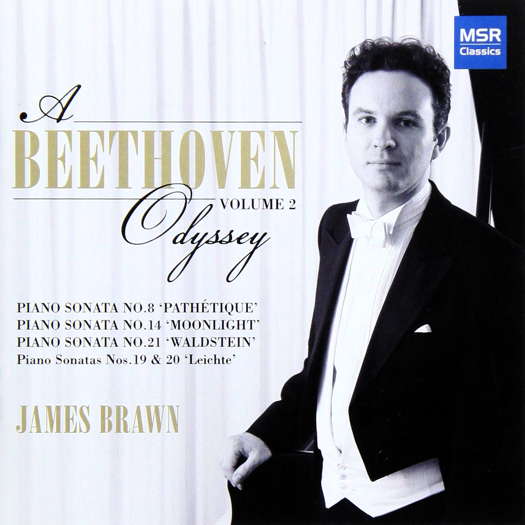
Perfect Indeed
More Beethoven
from James Brawn -
recommended by
ANDREW SCHARTMANN'... a profound - almost spiritual - connection to the music ...'
|

|
The first volume of Brawn's Beethoven Odyssey left me speechless, at least until time forced me to put pen to paper. I eventually wrote that his 'journey through these towering [sonatas] is one of the most convincing I've heard in a long time'. That same assessment applies twofold to the second volume of his ambitious project, which dispels any possibility that the brilliance of his first essay was a mere fluke.
His interpretation of Beethoven's 'Pathétique' sonata strikes a perfect balance between improvisation and control. Brawn's weighing back and forth between the two finds its most successful expression in the opening movement's final statement of slow-introduction material. Time is stretched ever so slightly to create suspense, but not distorted to the extent that we feel lost. Such perfect placement of notes comes only with experience and a profound — almost spiritual — connection to the music itself.
Listen -- Beethoven: Allegro molto e con brio (Piano Sonata No 8 in C minor)
(track 1, 7:47-8:48) © 2013 James Brawn:
Equally impressive to Brawn's negotiation of temporal elasticity is the expressive purity of his playing. He finds no use for grand romantic gestures, opting instead for transparent textures that give space to every single note of Beethoven's intricate musical canvases. Contrary to what one might expect, the result is neither mechanical nor emotionally stale; it is, rather, deeply intellectual and moving. Brawn's treatment of the rondo's invertible counterpoint is a case in point.
Listen -- Beethoven: Rondo (Allegro) (Piano Sonata No 8 in C minor)
(track 3, 1:41-2:37) © 2013 James Brawn:
This characteristic simplicity is responsible for one of the most affecting performances of the 'Moonlight' sonata on record. Brawn's Adagio sostenuto does not ring out with contrived infusions of superficial 'feeling'. It is patently unpretentious — an unwavering meditation in sound that is at once fixed and dynamic. As infinite colors emerge from the piano, Brawn's carefully crafted layers provide a rich but subtle feast for our ears.
Listen -- Beethoven: Adagio sostenuto (Piano Sonata No 14 in C sharp minor)
(track 4, 0:00-1:10) © 2013 James Brawn:
The same delicacy of touch pervades his performance of Beethoven's two 'lighter' sonatas, Op 49. Often viewed as the lesser appendages of a more masterful thirty-sonata corpus, these works tend to receive peripheral attention from those who tackle the complete Beethoven cycle. Brawn's interpretation, however, reveals meticulous reflection with respect to local texture, dynamics, and large-scale form. All three of these factors come together beautifully in the rondo finale of the G-minor sonata, Op 49, No 1.
Listen -- Beethoven: Rondo (Allegro) (Piano Sonata No 19 in G minor)
(track 8, 0:00-0:38) © 2013 James Brawn:
This excitement bleeds over into Brawn's performance of the mighty 'Waldstein' sonata, Op 53. His approach to the opening movement is somehow both reserved and bursting at the seams. By holding back, Brawn achieves a tone of considerable warmth, which draws attention to his exquisite voicing. Yet one cannot help but sense the restlessness behind his playing — a restlessness so extreme that he nearly loses control of the transition's speedy scalar passages. Far from being detrimental to the overall effect, however, this riding-on-the-edge feel conjures some of the Beethovenian fire that lies at the very heart of this music.
Listen -- Beethoven: Allegro con brio (Piano Sonata No 21 in C)
(track 11, 0:00-1:08) © 2013 James Brawn:
As with the first volume of Brawn's Odyssey, no review can do justice to the many fine passages that await the eager listener. Nor would it be appropriate to attempt a comprehensive account of Brawn's playing in words. As I wrote the first time around, 'There is an element of purity in his playing — some ineffable quality — that transforms even the simplest of phrases into something pristine, something perfect'. Perfect indeed. If Brawn continues on this path, his Beethoven cycle could very well turn into something special — something for which he will be remembered by generations to come.
Copyright © 28 April 2014
Andrew Schartmann,
Connecticut USA

| 
